学术综合英语unit2
综合英语第四册unit2翻译及paraphrase
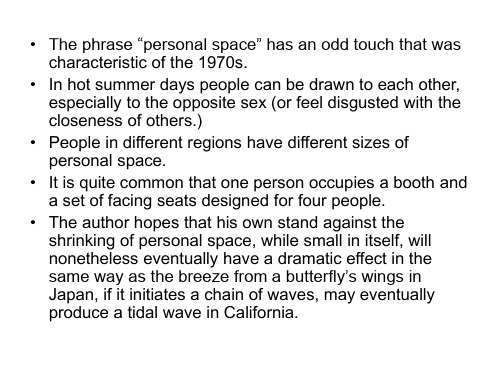
• The pigeon was wedged in the fork of a branch and it fell after a while. • The payment that the motorist will have to make is proportional to the amount of damage he has done to the other person’s car. • You can only enter the cave by inching through a narrow tunnel on your stomach. • She stammered some apologies for entering my office without knocking as she sidled towards tto explain to me that I was dismissed not because I didn’t do my work well but because the company was confronted by financial troubles. • The enlistment of young soldiers infused new hope and morale into the army. • once the older boys stake a claim to the lawn, the younger ones had to give way to them to avoid conflict. • The man following her made her uneasy and she couldn’t help quickening her steps.
外研社学术英语(第二版)综合Unit 2 (教师用书U2
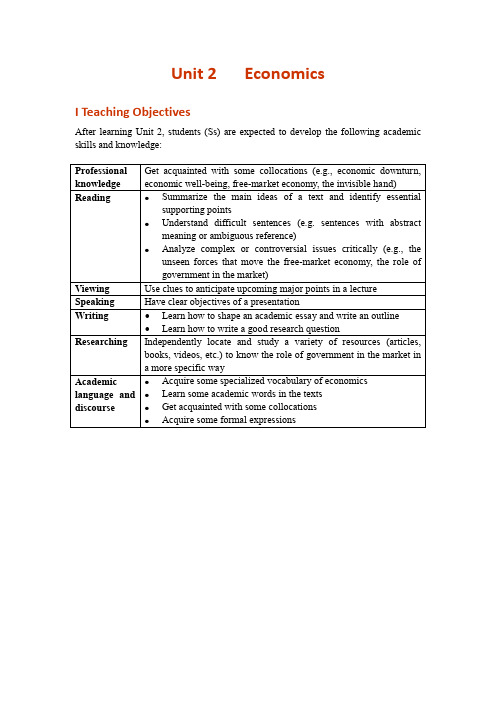
Unit 2 EconomicsI Teaching ObjectivesAfter learning Unit 2, students (Ss) are expected to develop the following academic skills and knowledge:II Teaching Activities and ResourcesReadingText ALead-inTeaching StepsAsk Ss to work in pairs and do the task in Lead-in. Then invite several Ss to share their answers with the whole class.Answer Keys1.The invisible hand.2.Our economic life is made possible by the skill and labor of vast numbers of totalstrangers.The activities of countless far-flung men and women have to be intricately choreographed and precisely timed. However, no one coordinates it, and yet they do cooperate. It’s “the invisible hand” —the mysterious power that leads innumerable people, each working for his own gain, to promote ends that benefit many. Out of the seeming chaos of millions of uncoordinated private transactions emerges the spontaneousText AnalysisTeaching Steps1.OverviewAsk Ss to preview Text A before class. Or, allocate some time for Ss to read the text quickly in class. Then invite several Ss to summarize the main idea of Text A.2.In-Depth Analysis1)Show Ss the following words and ask them to contribute to the class as muchas possible with what they know about these words. Provide additional information in Supplementary Information when necessary.•the invisible hand•free-market economy•economic downturn•An Inquiry into the Nature and Causes of the Wealth of Nations2)Explain some important language points in Language Support to Ss.3)Discuss with Ss the invisible hand in the author’s eyes by doing Task 1 inCritical reading and thinking.4)Organize a group discussion about the questions from Task 2 in Criticalreading and thinking. Encourage Ss to think independently, critically and creatively and share their ideas with each other.Supplementary Information1.free-market economyIn a free market economy, the laws and forces of supply and demand, rather than a central government, regulate production and labor. The prices for goods and services are self-regulated by buyers and sellers negotiating in an open market.Most companies and resources are not owned by the state. Instead, they are owned by private individuals or entities who are free to trade contracts with each other. 2.economic downturnAn economic downturn is a general slowdown in economic activity over a sustained period of time. It occurs when the value of stocks, property, and commodities fall, productivity either grows more slowly or declines, and GDP shrinks, stands still or expands more slowly. It can happen in a specific region (e.g.the Asian financial crisis in the late 1990s) or on a global scale (e.g. the global financial crisis in the late 2000s). The main features of an economic downturn include rising unemployment, falling share and house prices, low consumer confidence and declining investment.4.An Inquiry into the Nature and Causes of the Wealth of Nations(《国富论》)An Inquiry into the Nature and Causes of the Wealth of Nations, usually abbreviated as The Wealth of Nations, is Adam Smith’s masterpiece. It was first published in 1776, and is widely considered to be the first modern work in economics. Through reflection over the economics at the beginning of theIndustrial Revolution, the book touches upon broad topics such as the division of labor, productivity and free markets.Language Support1.Individual buyers and sellers will act according to what is in their own bestinterests. (Para. 2)The phrase “in one’s interest” means “for one’s benefit or advantage”(为了……的利益;为……着想). There are some relevant expressions, such as “in the interest of one”, “in one’s own interest”, and “in one’s best interest”.e.g. It’s obviously in their interest to increase profits.I suspect it’s in your own best interest to quit now.2.Customers are likewise typically looking out for their self-interests. (Para. 4)The word “likewise” is used to signal a comparison that explains how things are similar(同样的;此外).e.g. In this episode, we will likewise deal with another extremely commonquestion.Just water these plants twice a week, and likewise the ones in the bedroom.Other special words and expressions are often used to signal the comparison of two or more people, places, things, ideas, etc. Here are some examples of these signposts for your reference:similarly, both, just as, and also, resemble, parallel, in the same manner, inthe same way, alike, equally3.The market becomes more efficient as buyers and sellers move in the samedirection—as if directed by an invisible hand. (Para. 5)这里的as if用于省略句。
最新新核心综合学术英语教程-4-Unit-2-参考答案

Unit 2•评估母乳喂养的锐减程度•assess the extent of decline in breast-feeding•不良改变的诱发因素•the major factors responsible for the negative change•就住房和一般生活成本而言•in terms of housing and general cost of living•被奶瓶文化所取代•give way to the “bottle culture”•补充其他食物be supplemented with other foods•对延长母乳喂养产生不利影响•Militate against prolonged breast-feeding•宏观经济与社会文化因素的复杂交织•complex interactions between broad economic and socio-cultural factors•把负面的变化归因于从发达国家舶来的态度和影响•attribute the negative change to attitudes and influences imported from the developed world•不符合母亲的营养意识•fall short of the mother’s nutritional awareness•等同于极端的个人及社会贫困•be synonymous with extreme individual and community povertyTask 1 (Page 32)1. D2. C3. E4. A5. B6. L7. K8. O 9. J 10. N 11. F 12. M 13. M 14. HTask 2 (Page 33)1) The report attempts to evaluate current maternal perceptions of infant-feedingamong different ethnic, religious, cultural, and socio-economic groups in Nigeria. The research questions include: What is the current situation of the decline in breast-feeding in Nigeria? What are the major factors responsible for the negative change? How to institute corrective educational measures? (B) 2) The metropolitan Lagos is heterogeneous in its ethnic and socio-economic composition. (B)3) Most of the earlier reports attributed the negative change to attitudes andinfluences imported from the developed world and the preference for bottle-feeding by the urbanized African. (L)4) For most Nigerians, urban existence means extreme individual and communitypoverty. Implicit in this is a great pressure on mothers to spend more time trying to augment the family income at the expense of caring adequately for their children. (M)5) Childhood malnutrition is more a result of objective conditions of people’s livesthan ignorance on the mother’s part. (N)Task 3 (Page 42)1. h2. j3. m4. n5. q6. v7. u8. a9. t 10. b 11. s 12. l 13. c 14. d 15. r 16. p 17. e 18. o 19. k 20. i 21. g 22. f 23. wTask 41) The government accorded him the rank of Colonel.授予,给予 present with, grant, confer, give, render2) She did not understand the dimension of her plight.方面 scope, extent3) Today his company continues to thrive.兴旺,繁荣 flourish, bloom, prosper, grow rich4) The discrepancy between press and radio reports is obvious.差异difference, disparity, divergence, disagreement, dissimilarity, incongruity, contradiction, inconsistency, incongruousness, discordance5) None of these buildings are noteworthy for their architecture.值得关注的,重要的,显著的great, magnitudinous, important, notable, signif icant, exceptional, towering, extraordinary, outstanding, remarkable6) We will institute some legal proceedings against the company.开始实行,着手,提起(诉讼)initiate, introduce, originate, launch, start, begin7) She keeps extolling his managerial skills.赞美 acclaim, praise, pay tribute to, glorify, applaud, compliment8) They attribute their success to external causes such as luck.归因于 ascribe, assign, credit9) The heterogeneous society of today should be taken into account.各种各样的 varied, mixed, diversified, assorted, diverse10) The great virtue of camping is its cheapness.优点 plus, strength, advantage, asset, benefit, merit11) Going grey is not necessarily synonymous with growing old.等同于 equivalent to, identical to, equal to, the same as, identified with, tantamount to, similar to12) She felt an overwhelming desire to have another child.难以抑制的,强烈的 overpowering, strong, compelling, uncontrollable, compulsive, irresistible, forceful, powerfulThe most formal ones are: disparity, ascribe, augment, incongruity, acclaim, initiate, burgeon, compelling, confer, pay tribute to, incongruous, tantamount to, discordance, compulsive, identi- fied with, assorted, meritTask 5 (Page 44)1) At least 29% of the families had incomes below N 2oo every month, which was muchlower than the minimum required living in a city ranked among the most expensive in the world when it comes to housing and general cost of living.2) As could be clearly seen from the present study, there was a wide gap betweenwomen’s actual infant-feeding practice and their opinions on what the practice should be like. In most of the cases the mothers’ nutritional awareness is better than their actual practice, and this is contradictory to the widely held beliefs that those illiterate and urbanized women suffer from inappropriate counseling.3) Most of the earlier reports believe that people’s attitudes change negativelybecause of the influences from the developed world and the preference of bottle-feeding to breast-feeding by the urbanized African. Clearly such explanations are too simple and only suit a small number of people for they neglect the harsh realities of urban existence, which makes it diff icult for the mothers to prolong breast-feeding.Task 6 (Page 44)Main idea: Research shows that childhood malnutrition is more a result of objective conditions of people’s lives than ignorance on the mother’s part.Task 7 (Page 45)The major objective of the research paper is to assess the extent of decline in breast-feeding as well as the factors responsible for the negative change, and measures to tackle the problem. The study sample comprised 558 randomly selected women residents in Surulere, Nigeria. An interview was conducted by a standard questionnaire to obtain information. Research shows that the decline in breast-feeding in Nigeria is mainly due to the harsh realities of urban existence, which means extreme individual and community poverty. The current trend will not be reversed if the major structural defect of urban life in the developing world is not eliminated or controlled. Much can be done to educate the mothers on the use of hygienically acceptable supplementary foods from relatively inexpensive but nutritious locally available staple foods.Task 10 (Page 45)Breastfeeding Faces Challenges in ChinaUrbanization is closely linked to modernization, industrialization, and the sociological process of rationalization. Urbanization can describe a specif ic condition at a set time, i.e. the proportion of total population or area in cities or towns, or the term can describe the increase of this proportion over time. So the term urbanization can represent the level of urban development relative to overall population, or it can represent the rate at which the urban proportion is increasing.Upon hearing her baby wail, Zhang Shuyi finds herself at her wit’s end. Although she was previously confident that she would be able to breastfeed her child properly, she worries that she might not be able to give her baby enough milk.After giving birth to her son two years ago, 35-year-old Zhang, a doctor at the Capital Institute of Pediatrics in Beijing has continued to practice exclusive breastfeeding in strict accordance with international standards.Task 12 (Page 54)1) Para K Its topic sentence: Complex interactions between broad economic and socio-cultural factors inf luence infant-feeding practices in the developing countries.2) Para O Its topic sentence: Perhaps more lasting benefits will be achieved by emphasizing the education of mothers on how to prepare and use hygienically acceptable supplementary foods from relatively inexpensive but nutritious locally available staple foods.Academic Survival SkillsTask 1 (Page 58)Question 2S trong author version: Anyanwu (1985) claimed that “for most Nigerians, urban existence is synonymous with extreme individual and community poverty” for the great economic pressure on the mothers leave them little time to care adequately for their children. W eak author version: For most Nigerians, the great economic pressure on the mothers leave them little time to care adequately for their children, thus “urban existence is synonymous with extreme individual and community poverty”(Anyanwu, 1985).Question 3 Strong author version: Anyanwu (1985) claimed that it would be better if emphasis could be put on the education of mothers “on how to prepare and use hygienically acceptable supplementary foods from relatively inexpensive but nutritious locally availab le staple foods.” Weak author version: It will be better if emphasis can be put on the education of mothers “on how to prepare and use hygienically acceptable supplementary foods from relatively inexpensive but nutritious locally available staple foods” (A nyanwu, 1985).Task 2 (Page 59)1) Direct quotation. 2) The original source is quoted with a brief explanation in the beginning of the sentence. 3) The original source is quoted with the author’s comment inserted in the middle of the sentence.Task 3 (Page 59)A summary is much shorter than the original source for it only contains the main idea, omitting the details, while a paraphrase is usually the same length as the original source, making changes in vocabulary and structures about some diff icult words and expressions.Task 4 (Page 60)2) Chinese big cities suffer from congestion due to the steadily increasing number of vehicles.3) Some complex sentences may be meaningless.4) Learners are active for they attempt to learn from their experiences.5) Some educators believe that the choice of major makes the biggest difference for students entering college, while others think differently.6) Social networking services (SNS) has changed the way people socialize.7) H irshi and Gottfredson advance the theory of “self-control” to explain people’s propensity to commit or refrain from crimes.Task 6 (Page 64)Paragraph 2 Summary: Gordon and Taylor argue that the difficulties experienced by people with writing will become easier if they learn to deal with their reactions to it appropriately.Paragraph 3 Summary: Frick argues that education has been signif icantly changed by technology at some major turning points in history. The f irst example was the primitive modes of communication in prehistoric times.Paragraph 4 Summary: Hewitt believes that acts of academic dishonesty undermine the validity of the measure of learning.Paragraph 5 Summary: Edelso argues that besides natural resources, there are more important factors determining the wealth of people—the fundamental political andlegal institutions of a nation. 典型的焊接缺陷:未焊透。
新核心综合学术英语教程Unit 2
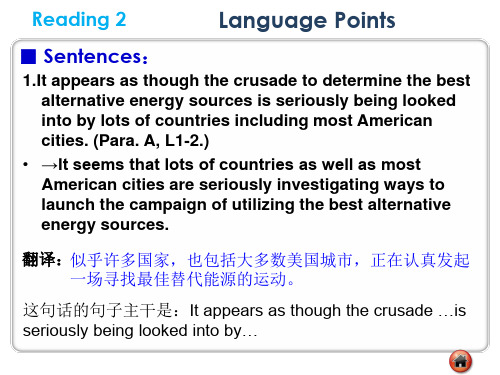
Reading 2
Language Points
2. The downside of geothermal energy is the fact that it
is expensive to build, and to ensure that no harmful by-products are going to be produced in the process, geothermal plants must be created accordingly. (Para. H, L41-43.) →There are two negative aspects of geothermal energy. One is that it is expensive to build and the other is geothermal plants must be set up to ensure no harmful by-products during the process.
翻译 地热能的不足之处就是其获取费用太高,但为了确保 : 在利用地热能过程中无有害副产品的产生,地热发电
厂的修建必不可少。
Reading 2
Language Points
5.The difference is that we use the force of the water to push the turbine which in turn powers a generator thus generating electricity.(Para. I, L48-49.) 翻译 : 那就是,现在利用水力推动涡轮机为 发电机提供动力,进而产生电能。
Reading 2
Language Points
学术英语综合Unit2

Text A In-depth analysis
2. Discuss the features of the two versions of Adam Smith’s theory on the basis of Task 1/Critical reading and thinking/Text A.
Unit 2
Business Ethics
Text A In-depth analysis
1. Contribute as much as possible what you know about the following.
• economic system • free enterprise
Unit 2
Adam Smith’s theory vs. modified version of Adam Smith’s theory; pros and cons of social responsibility; economic model vs. socioeconomic model ,etc.)
Profit maximization is the right stockholders.
goal for a business.
Unit 2
Business EthicsLeabharlann Unit Contents
Unit objectives Text A Text B Text C Academic language and discourse Listening Speaking Writing
Unit 2
Business Ethics
formal and informal English and acquire some formal expressions
新核心综合学术英语教程 4 Unit 2 参考答案

Unit 2•评估母乳喂养的锐减程度•assess the extent of decline in breast-feeding•不良改变的诱发因素•the major factors responsible for the negative change•就住房和一般生活成本而言•in terms of housing and general cost of living•被奶瓶文化所取代•give way to the “bottle culture”•补充其他食物be supplemented with other foods•对延长母乳喂养产生不利影响•Militate against prolonged breast-feeding•宏观经济与社会文化因素的复杂交织•complex interactions between broad economic and socio-cultural factors•把负面的变化归因于从发达国家舶来的态度和影响•attribute the negative change to attitudes and influences imported from the developed world•不符合母亲的营养意识•fall short of the mother’s nutritional awareness•等同于极端的个人及社会贫困•be synonymous with extreme individual and community povertyTask 1 (Page 32)1. D2. C3. E4. A5. B6. L7. K8. O9. J10. N11. F12. M13. M14. HTask 2 (Page 33)1) The report attempts to evaluate current maternal perceptions of infant-feeding amongdifferent ethnic, religious, cultural, and socio-economic groups in Nigeria. The research questions include: What is the current situation of the decline in breast-feeding in Nigeria?What are the major factors responsible for the negative change? How to institute corrective educational measures? (B)2) The metropolitan Lagos is heterogeneous in its ethnic and socio-economic composition. (B)3) Most of the earlier reports attributed the negative change to attitudes and influencesimported from the developed world and the preference for bottle-feeding by the urbanized African. (L)4) For most Nigerians, urban existence means extreme individual and community poverty.Implicit in this is a great pressure on mothers to spend more time trying to augment the family income at the expense of caring adequately for their children. (M)5) Childhood malnutrition is more a result of objective conditions of people’s lives thanignorance on the mother’s part. (N)Task 3 (Page 42)1. h2. j3. m4. n5. q6. v7. u8. a9. t10. b 11. s12. l 13. c14. d15. r16. p17. e18. o19. k20. i21. g22. f23. wTask 41) The government accorded him the rank of Colonel.授予,给予present with, grant, confer, give, render2) She did not understand the dimension of her plight.方面scope, extent3) Today his company continues to thrive.兴旺,繁荣flourish, bloom, prosper, grow rich4) The discrepancy between press and radio reports is obvious.差异difference, disparity, divergence, disagreement, dissimilarity, incongruity, contradiction, inconsistency, incongruousness, discordance5) None of these buildings are noteworthy for their architecture.值得关注的,重要的,显著的great, magnitudinous, important, notable, signif icant, exceptional, towering, extraordinary, outstanding, remarkable6) We will institute some legal proceedings against the company.开始实行,着手,提起(诉讼)initiate, introduce, originate, launch, start, begin7) She keeps extolling his managerial skills.赞美acclaim, praise, pay tribute to, glorify, applaud, compliment8) They attribute their success to external causes such as luck.归因于ascribe, assign, credit9) The heterogeneous society of today should be taken into account.各种各样的varied, mixed, diversified, assorted, diverse10) The great virtue of camping is its cheapness.优点plus, strength, advantage, asset, benefit, merit11) Going grey is not necessarily synonymous with growing old.等同于equivalent to, identical to, equal to, the same as, identified with, tantamount to, similar to12) She felt an overwhelming desire to have another child.难以抑制的,强烈的overpowering, strong, compelling, uncontrollable, compulsive, irresistible, forceful, powerfulThe most formal ones are: disparity, ascribe, augment, incongruity, acclaim, initiate, burgeon, compelling, confer, pay tribute to, incongruous, tantamount to, discordance, compulsive, identi- fied with, assorted, meritTask 5 (Page 44)1) At least 29% of the families had incomes below N 2oo every month, which was much lowerthan the minimum required living in a city ranked among the most expensive in the world when it comes to housing and general cost of living.2) As could be clearly seen from the present study, th ere was a wide gap between women’sactual infant-feeding practice and their opinions on what the practice should be like. In most of the cases the mothers’ nutritional awareness is better than their actual practice, and this is contradictory to the widely held beliefs that those illiterate and urbanized women suffer from inappropriate counseling.3) M ost of the earlier reports believe that people’s attitudes chang e negatively because of theinfluences from the developed world and the preference of bottle-feeding to breast-feeding by the urbanized African. Clearly such explanations are too simple and only suit a small number of people for they neglect the harsh realities of urban existence, which makes it diff icult for the mothers to prolong breast-feeding.Task 6 (Page 44)Main idea: Research shows that childhood malnutrition is more a result of objective conditions of people’s lives than ignorance on the mother’s part.Task 7 (Page 45)The major objective of the research paper is to assess the extent of decline in breast-feeding as well as the factors responsible for the negative change, and measures to tackle the problem. The study sample comprised 558 randomly selected women residents in Surulere, Nigeria. An interview was conducted by a standard questionnaire to obtain information. Research shows that the decline in breast-feeding in Nigeria is mainly due to the harsh realities of urban existence, which means extreme individual and community poverty. The current trend will not be reversed if the major structural defect of urban life in the developing world is not eliminated or controlled. Much can be done to educate the mothers on the use of hygienically acceptable supplementary foods from relatively inexpensive but nutritious locally available staple foods.Task 10 (Page 45)Breastfeeding Faces Challenges in ChinaUrbanization is closely linked to modernization, industrialization, and the sociological process of rationalization. Urbanization can describe a specif ic condition at a set time, i.e. the proportion of total population or area in cities or towns, or the term can describe the increase of this proportion over time. So the term urbanization can represent the level of urban development relative to overall population, or it can represent the rate at which the urban proportion is increasing.Upon hearing her baby wail, Zhang Shuyi finds herself at her wit’s end. Although she waspreviously confident that she would be able to breastfeed her child properly, she worries that she might not be able to give her baby enough milk.After giving birth to her son two years ago, 35-year-old Zhang, a doctor at the Capital Institute of Pediatrics in Beijing has continued to practice exclusive breastfeeding in strict accordance with international standards.Task 12 (Page 54)1) Para K Its topic sentence: Complex interactions between broad economic and socio-cultural factors inf luence infant-feeding practices in the developing countries.2) Para O Its topic sentence: Perhaps more lasting benefits will be achieved by emphasizing the education of mothers on how to prepare and use hygienically acceptable supplementary foods from relatively inexpensive but nutritious locally available staple foods.Academic Survival SkillsTask 1 (Page 58)Question 2S trong author version: Anyanwu (1985) claimed that “for most Nigerians, urban existence is synonymous with extreme individual and community poverty” for the great economic pressure on the mothers leave them little time to care adequately for their children. W eak author version: For most Nigerians, the great economic pressure on the mothers leave them little time to care adequately for their children, thus “urban existence is synonymous with extreme individual and community poverty”(Anyanwu, 1985).Question 3 Strong author version: Anyanwu (1985) claimed that it would be better if emphasis could be put on the education of mothers “on how to prepare and use hygienically acceptable supplementary foods from relatively inexpensive but nutritious locally availab le staple foods.” Weak author version: It will be better if emphasis can be put on the education of mothers “on how to prepare and use hygienically acceptable supplementary foods from relatively inexpensive but nutritious locally available staple foods” (A nyanwu, 1985).Task 2 (Page 59)1) Direct quotation. 2) The original source is quoted with a brief explanation in the beginning of the sentence. 3) The original source is quoted with the author’s comment inserted in the middle of the sentence.Task 3 (Page 59)A summary is much shorter than the original source for it only contains the main idea, omitting the details, while a paraphrase is usually the same length as the original source, making changes in vocabulary and structures about some diff icult words and expressions.Task 4 (Page 60)2) Chinese big cities suffer from congestion due to the steadily increasing number of vehicles.3) Some complex sentences may be meaningless.4) Learners are active for they attempt to learn from their experiences.5) Some educators believe that the choice of major makes the biggest difference for students entering college, while others think differently.6) Social networking services (SNS) has changed the way people socialize.7) Hirshi and Gottfreds on advance the theory of “self-control”to explain people’s propensity to commit or refrain from crimes.Task 6 (Page 64)Paragraph 2 Summary:Gordon and Taylor argue that the difficulties experienced by people with writing will become easier if they learn to deal with their reactions to it appropriately. Paragraph 3 Summary:Frick argues that education has been signif icantly changed by technology at some major turning points in history. The f irst example was the primitive modes of communication in prehistoric times.Paragraph 4 Summary: Hewitt believes that acts of academic dishonesty undermine the validity of the measure of learning.Paragraph 5 Summary: Edelso argues that besides natural resources, there are more important factors determining the wealth of people—the fundamental political and legal institutions of a nation.。
Unit2 Energy for Planet Earth 课文翻译
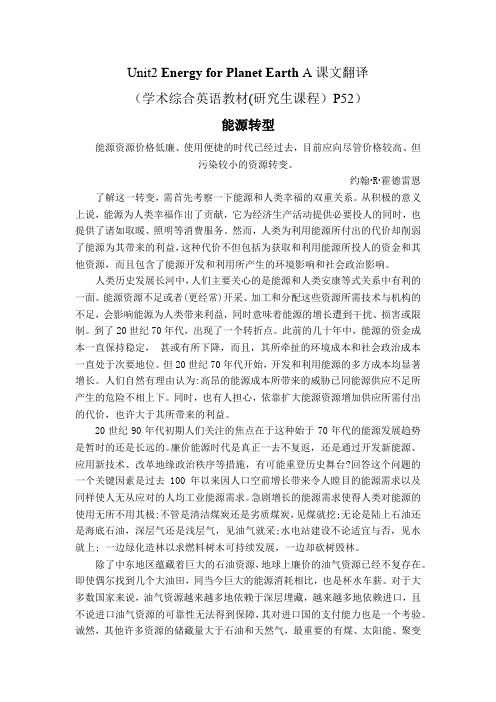
Unit2 Energy for Planet Earth A课文翻译(学术综合英语教材(研究生课程)P52)能源转型能源资源价格低廉、使用便捷的时代已经过去,目前应向尽管价格较高、但污染较小的资源转变。
约翰∙R∙霍德雷恩了解这一转变,需首先考察一下能源和人类幸福的双重关系。
从积极的意义上说,能源为人类幸福作出了贡献,它为经济生产活动提供必要投人的同时,也提供了诸如取暖、照明等消费服务。
然而,人类为利用能源所付出的代价却削弱了能源为其带来的利益,这种代价不但包括为获取和利用能源所投人的资金和其他资源,而且包含了能源开发和利用所产生的环境影响和社会政治影响。
人类历史发展长河中,人们主要关心的是能源和人类安康等式关系中有利的一面。
能源资源不足或者(更经常)开采、加工和分配这些资源所需技术与机构的不足,会影响能源为人类带来利益,同时意味着能源的增长遭到干扰、损害或限制。
到了20世纪70年代,出现了一个转折点。
此前的几十年中,能源的资金成本一直保持稳定,甚或有所下降,而且,其所牵扯的环境成本和社会政治成本一直处于次要地位。
但20世纪70年代开始,开发和利用能源的多方成本均显著增长。
人们自然有理由认为:高昂的能源成本所带来的威胁已同能源供应不足所产生的危险不相上下。
同时,也有人担心,依靠扩大能源资源增加供应所需付出的代价,也许大于其所带来的利益。
20世纪90年代初期人们关注的焦点在于这种始于70年代的能源发展趋势是暂时的还是长远的。
廉价能源时代是真正一去不复返,还是通过开发新能源、应用新技术、改革地缘政治秩序等措施,有可能重登历史舞台?回答这个问题的一个关键因素是过去100 年以来因人口空前增长带来令人瞠目的能源需求以及同样使人无从应对的人均工业能源需求。
急剧增长的能源需求使得人类对能源的使用无所不用其极:不管是清洁煤炭还是劣质煤炭,见煤就挖;无论是陆上石油还是海底石油,深层气还是浅层气,见油气就采;水电站建设不论适宜与否,见水就上; 一边绿化造林以求燃料树木可持续发展,一边却砍树毁林。
学术综合英语Unit2读写课文A文后词汇练习答案
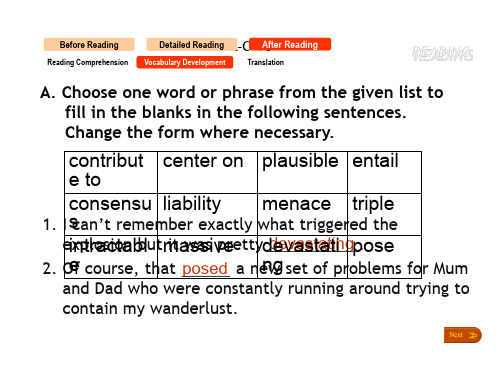
from
cy
with
ng
portend plausible augment emerge nce
10.aTghgerashvoarttiagpeinofdcolewann ensertrgiykirnegsourcesrepslaugrugees all
nngations.
nce
inadequacy
idnatnragecrtatoblAmmeraicsasnivceivilizdateiovnasretamtiainpeods.e 7. Aes the surgeon’s health wonrgsened, he became a
_l_ia_b__il_it_y_ to the hospital.
ng
nce
on a par with
7. The most profound change in our society since the sixties has not been the arrival of new Britons but the appearance of a new class.
R-C- Detailed Reading
VAf2ter Reading
Vocabulary Development
Translation
detract inadequa on a par staggeri
from
cy
with
ng
portend plausible augment emerge 4. It may be the band’s trademark, but aftenrctehe
Before Reading
Reading Comprehension
(完整版)学术英语综合课后答案季佩英

Unit 1Language building-upTask 1/Specialized vocabulary1. 饲料经销商;饲料批发商2. 为他自己的收益而工作3. 技能与劳动力4. 制造塑料5. 私人交易6. 包装并定价7. 无形之手1. priced2. labor3. transactions4. gain5. labor; manufactured6. invisible hand7. distributorTask 2/Signpost language1. Today, in millions of homes across the nation, God will be thanked for many gifts, for the feast on the table and the company of loved ones, for health and good fortune in the year gone by, for peace privilege of having been born, or having become —American(Line 2, Para.1).2. And yet, isn't there something wondrous, —something almost inexplicable in the way your Thanksgiving weekend is made possible by the skill and labor of vast numbers of total strangers? (Line 1, Para. 4)3. ...Thanksgiving Turkey, there would be one, —or more likely, a few dozen—waiting. (Line 3, Para.6)Task 3/Formal English1. very many2. buying or selling3. a large group of4. more huge5. understand6. troubledUnit 2Language buildingTask 1:Part 1:1)无形之手;2)自由企业制度3)股东4)经济体制5)开发产品和服务6)市场力量;市场调节作用7)金融机构8)严重衰退9)破产10)mission11)stock price12)corporate motto13)assets14)maximize profits 15)financial systemPart 2:1)market forces2)financial institutions 3)free enterprise system 4)deep institutions5)invisible hand6)stockholder7)profit maximization 8)economic system Task 2:1.and;2.Another;3. also;4. Not only;but;5. otherTask 31. understanding;2. agree with;3. forces…to be accepted;4. bad5. purpose6. charitable ;7. given;8.famous.Unit 3Language buildingTask 1: collocationPart 1:1) 充满敬畏与感激;2)与外部世界隔离3)陷入绝境4)易感抑郁5)恢复体能6)界定性特征7)暂时的挫败8)不因挫败而心烦意乱9)竞选权位10)吹着欢快的曲调Part 2:1)bout 2)validated3)squabble 4)aptitude5)platitude 6)debilitate7)reassuring 8)undermine9)ruminate 10)martialTask 2:1.contrasting;2.in contrast;3. However;4. different;5. on the other hand6. in the opposite way7.howeverTask 31. full of;2. becomes alert and energetic3. keeping thinking about4. been left in hopelessness5. likely to suffer from6. not disturbed7. saying something that people are quite familiar with8. officially approvedUnit 4Language buildingTask 1: collocationPart 1:1. green movement2. protected areas3. extinction of animals and plants4. wild fish stocks5. make clean power6. save resources7. 培育生物多样性8. 控制污染9. 阻止对生态体系的破坏10. 扩大清洁产业11. 集体世界观12. 生态经济Part 2:1. Embedding a narrative that moves us on from protecting nature from people to protecting nature for people is an essential part of this reframing. (Para.6)If such a narrative is to gain practical effect, then looking after nature must urgently be seen as not only an environmental challenge, but also an economic one. (Para.7)The author manages to bring in a new topic and maintain coherence by repeating keys words such as narrative, nature.2. So long as we continue to travel in two directions at once, promoting environmental goals on the one hand while on the other directly contradicting that with measures to achieve more economic growth, the longer we will fail to make real progress. (Para.7)When it comes to economics and ecology there is plenty of good thinking already done. (Para.8) The author manages to bring in a new topic and maintain coherence by repeating key words such as economic, economics.Task 3 Formal language1. unchangeable; increasing2. control3. effort; charitable4. pleasant detail5. complicated6. change7. Changing8. importantUnit 5Language buildingTask 1: collocationPart 1:1. having a mind2.behave as if you understand3.what and how we know4.inside;reflectsMentalist Dbehaviorist BEpistemologist Aphenomenologist CPart 21. psychological2.spiritual3.behaviour4.phenomenologist5.perplexity6.mentallyTask 2:…,classified…This class of…The class of……a less severe label…The huge classTask 31. what we imagine about computers today2.we have broken the distinction between ???3.for the sake of convenience so that it is easier to refer to the first type of response4. you have the same reason for thinking that M had a mind.5. (The reason you believe your mother has a mind is based) not on your prejudice6. as groundless as believing that computers have mindUnit 6Task 1: Specialized vocabularyPart 11. 数学化,数字处理2. 计算机辅助设计3. 统计4. 基因组学5. 运筹学6. 优化组合7. 概率8. 数据库Part 2:1. database2. CAD3. statistics4. probability5. optimization6. genomics7. mathematization8. Operations researchTask 2:1. Here are a few simple examples of prescriptive mathematics that extended from single numbers to exceedingly complex systems:…(Line 1,para.8,Text A)2. Admittedly this is rather vague, but it will clarify a bit as I go on and mention a few of the manyexamples that Baker gives:…(Line 8, para.10, Text A)Task 3 Formal language1. exists2. included3. explained4. model5. get6. environment7. knowledgeable person; in which8. until now9. fix ideas of (caution) in one’s mindUnit 7Task 1: Specialized vocabularyPart 11. -h2.-f3.-a4.-j5.-i6.-b7.-d8.-g9.-c10.-ePart 2:1. To achieve professional development isimportant as a means to the end of becoming an expert and gaining more flexibility and independence2. Numerous studies over the last 30 years have suggested that personality is a powerful predictor of a person's life satisfaction3. An employee's work orientation is shaped in the first instance by their understanding of “what work is about”4. The government is trying to introduce new measures to create a better social safety net and encourage better worker pay5. Money has been used as the incentive of many intelligence contests in TV programTask 2:1. The present perfect tense(现在完成时)emphasizes that people’s conception about what money can bring them has changed greatly2. The tense switches from the present to the past to manifest that an example is given3.The tense switches between the present and the past to produce a comparison of different interpretations of a “calling”in different timesTask 3 Formal language1. pour heart and soul into :spare no efforts,try one's bestwhat will stimulate\encourage a worker to try his best in making good products?2. lure:temptationgrueling:working exhaustedlyPeople are no longer so tempted by the dream of becoming rich by working exhaustedly 80 hours a week for several years in a humble position3. lowly job:humble jobrecrafted:turnedHe might be doing a humble job,but he would turn it into a great mission4. entails:requiresA career requires more devotion to work5. contributing to:being beneficial toconnotation:implicationPeople who regard their work as a calling\great mission think that what they do helps serve the public and brings benefits to our society,and therefore it's quite proper to say that a mission\calling implies something similar to religious beliefsUnit8Task 1 Specialized vocabulare1. cultural tradition 文化传统2. social stability 社会稳定3. distinct identity 鲜明特色4. edge effect 边缘效应5. organic evolution 有机界进化6. mutual respect 相互尊重7.political correctness 政治正确性anic evolution2. mutual respect3. Edge effect4. social stability5. political correctness6. cultural tradition7. distinct identityTask 2 Signpost language1. Through; through; through2. not just; but3. first4. second5. next6. final7.not only; but alsoTask 3 Formal English1. develop2. combined3. skillful performers4. obvious5. friendly6. getting rid of7. combine8. changed9. imagine10. a large number ofUnit 9Task 1 Specialized vocabulary1 D 医疗2 J 基因分型3 F 内窥镜检查4 A 生物技术5 H 诊断6 C 分子的7 I 治疗方案8 E 医生9 G 外科医生的;手术的10 B 胶囊1 diagnosis2 surgical3 Biotechnology4 healthcare5 protocols6 molecularTask 2 Signpost language1 known as2 referred to as3 call4 describe5 meanTask 3 Formal English1 increases2 marked3 arrival/ coming4 replaced5 move away6 filledUnit 10Task 1 Specialized vocabulary1 b2 k3 f4 j5 g6 i7 e8 c9 h10 a11 d1 syntactic patterns2 Language faculty3 neural system4 underlying logic5 evolutionary adaptation6 formal instruction7 mental organ8 natural selectionTask 2 Signpost language1 for2 led to3 because4 Therefore5 Therefore6 because; because7 SoTask 3 Formal English1 explanation/interpretation; impacts2 is present all over; analyze/explain/interpret。
综合英语教程(3)—Unit2

2.The islanders could barely survive without an export crop.
没有出口作物,岛上的居民几乎无法生存。
adv. Inquiringly • She looked at me inquiringly. 'Well?'
她用探问的目光看看我说:“怎么样?”
make inquiries about
• 对某事进行调查,询问
• 1. We will make inquiries about the business possibilities of this new product of yours. 我们将调查一下你方这种新产品的销售可 能性。
2.The proprietor was an old acquaintance of his. 业主是他的一位旧相识。
conceivably
• (adv.) possibly 1.He couldn't conceivably have meant what he
said. 他的话想来不会是他的原意。
1. It embarrassed him that he had no idea of what was going on. 对所发生的事情一无所知,这让他很难堪。
2. He didn't mean to embarrass you. 他不是成心让你难堪。
Synonyms :shame ,discompose
n. embarrassment窘迫;难堪;令人难堪或耻辱的事 Her blush told of her embarrassment. 她脸红显露出她的困窘。
学术英语Unit1~4课文翻译
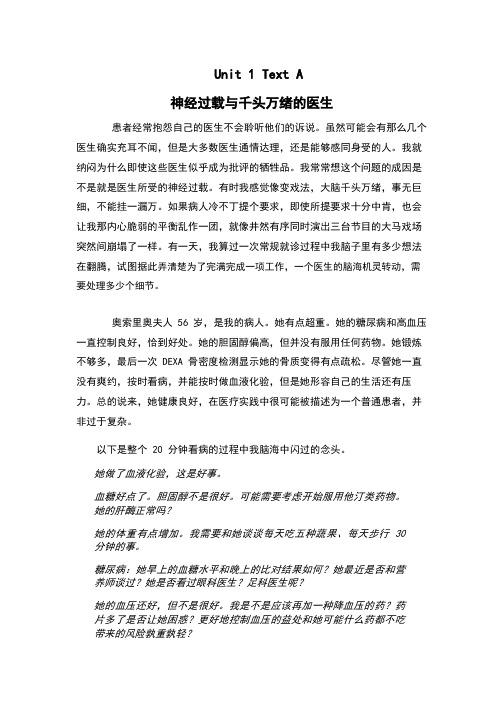
Unit 1 Text A神经过载与千头万绪的医生患者经常抱怨自己的医生不会聆听他们的诉说。
虽然可能会有那么几个医生确实充耳不闻,但是大多数医生通情达理,还是能够感同身受的人。
我就纳闷为什么即使这些医生似乎成为批评的牺牲品。
我常常想这个问题的成因是不是就是医生所受的神经过载。
有时我感觉像变戏法,大脑千头万绪,事无巨细,不能挂一漏万。
如果病人冷不丁提个要求,即使所提要求十分中肯,也会让我那内心脆弱的平衡乱作一团,就像井然有序同时演出三台节目的大马戏场突然间崩塌了一样。
有一天,我算过一次常规就诊过程中我脑子里有多少想法在翻腾,试图据此弄清楚为了完满完成一项工作,一个医生的脑海机灵转动,需要处理多少个细节。
奥索里奥夫人 56 岁,是我的病人。
她有点超重。
她的糖尿病和高血压一直控制良好,恰到好处。
她的胆固醇偏高,但并没有服用任何药物。
她锻炼不够多,最后一次 DEXA 骨密度检测显示她的骨质变得有点疏松。
尽管她一直没有爽约,按时看病,并能按时做血液化验,但是她形容自己的生活还有压力。
总的说来,她健康良好,在医疗实践中很可能被描述为一个普通患者,并非过于复杂。
以下是整个 20 分钟看病的过程中我脑海中闪过的念头。
她做了血液化验,这是好事。
血糖好点了。
胆固醇不是很好。
可能需要考虑开始服用他汀类药物。
她的肝酶正常吗?她的体重有点增加。
我需要和她谈谈每天吃五种蔬果、每天步行 30 分钟的事。
糖尿病:她早上的血糖水平和晚上的比对结果如何?她最近是否和营养师谈过?她是否看过眼科医生?足科医生呢?她的血压还好,但不是很好。
我是不是应该再加一种降血压的药?药片多了是否让她困惑?更好地控制血压的益处和她可能什么药都不吃带来的风险孰重孰轻?骨密度 DEXA 扫描显示她的骨质有点疏松。
我是否应该让她服用二磷酸盐,因为这可以预防骨质疏松症?而我现在又要给她加一种药丸,而这种药需要详细说明。
也许留到下一次再说吧?她家里的情况怎么样呢?她现在是否有常见的生活压力?亦或她有可能有抑郁症或焦虑症?有没有时间让她做个抑郁问卷调查呢?健康保养:她最后一次乳房 X 光检查是什么时候做的?子宫颈抹片呢? 50 岁之后是否做过结肠镜检查?过去 10 年间她是否注射过破伤风加强疫苗?她是否符合接种肺炎疫苗的条件?奥索里奥夫人打断了我的思路,告诉我过去的几个月里她一直背痛。
学术综合英语unit2

学术综合英语unit2学术综合英语Unit 2是关于学术写作的单元。
学术写作是一种特殊的写作风格,用于表达学术观点、研究结果和学术论证。
在这个单元中,我们将学习如何撰写学术论文、报告和研究文章。
首先,学术写作的目的是传达清晰、准确和可靠的信息。
在写作过程中,我们需要注意语言的准确性和逻辑性,避免使用模糊或不确定的词语。
我们应该使用学术术语和专业词汇来确保文章的专业性和可读性。
其次,学术写作需要遵循一定的结构和组织。
一篇学术论文通常包括引言、方法、结果和讨论等部分。
在引言中,我们介绍研究背景和目的;在方法部分,我们描述研究设计和数据收集方法;在结果部分,我们呈现实验结果和数据分析;在讨论部分,我们对结果进行解释和讨论。
这种结构有助于读者理解和跟随我们的论证过程。
此外,学术写作还需要引用和参考文献。
在学术界,我们需要引用其他学者的观点和研究成果来支持我们自己的论点。
引用的目的是展示我们对相关文献的了解,并避免抄袭。
我们应该正确地引用文献,并在文章末尾列出参考文献列表,以便读者查阅。
在学术写作中,我们还需要注意语法和标点符号的正确使用。
语法错误和标点符号的错误可能会导致句子不清晰或含义模糊。
因此,我们应该仔细检查文章中的语法和标点符号,并确保它们符合英语写作的规范。
最后,学术写作需要经过反复修改和润色。
写作是一个逐步改进的过程,我们应该不断修改和完善我们的文章。
我们可以请同行或老师进行审阅,并根据他们的反馈意见进行修改。
通过反复修改,我们可以提高文章的质量和可读性。
总之,学术综合英语Unit 2介绍了学术写作的基本原则和技巧。
学术写作需要准确、清晰和有条理,遵循特定的结构和组织,正确使用引用和参考文献,并经过反复修改和润色。
通过学习和实践,我们可以提高自己的学术写作能力。
新核心综合学术英语教程第三册 Unit 2

• 1) The effective disposal of the recognized sources of pollution demonstrates to be of great aid in the elevation of people’s quality of life. • 2) Since the rapid evolution of technology, the lifestyles of the generations ahead of us will witness a revolutionized change. • 3) Tapping heat from the Earth enables the residents of resource-poor regions to combat the poor conditions. • 4) The downside of the practice of fertilizing the soil by burning straws is the fact that the released dusts and particles pose a serious problem for the health of the respiratory system. • 5) This campaign, organized by environmentally conscious individuals, has a measurable effect on the general improvement of all the people’s environmental protection awareness
3.
• 1) Internet access is available in the students’ dormitory. • 2) If you can harness your energy, you’ll be rewarded with huge accomplishments. • 3) It has been confirmed that foul weather is highly hazardous for sea navigation. • 4) The governmental nuclear waste disposal plan aroused fierce protests from the local residents. • 5) Extinction of this rare species of bird is foreseeable if effective measures are not taken.
新核心综合学术英语教程第二册_Unit_2

Background Information
about science
Marxism
Sir Arthur Stanley Eddington
Alfred W. Adler
Claudius Ptolemy
about Science
• The extensive literature addressed to the definition or characterization of science is filled with inconsistent points of view and demonstrates that an adequate definition is not easy to attain. Part of the difficulty arises from the fact that the meaning of science is not fixed, but is dynamic. As science has evolved, so has its meaning. It takes on a new meaning and significance with successive ages. —Russell L. Ackoff • To spread healthy ideas among even the lowest classes of people, to remove men from the influence of prejudice and passion, to make reason the arbiter and supreme guide of public opinion; that is the essential goal of the sciences; that is how science will contribute to the advancement of civilization, and that is what deserves protection of governments who want to insure the stability of their power. —Georges Cuvier
最新学术综合英语英语填空题翻译Unit-2
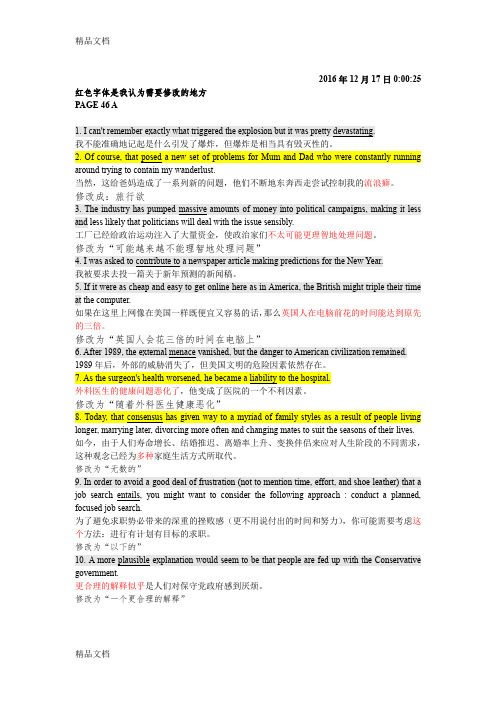
2016年12月17日0:00:25 红色字体是我认为需要修改的地方PAGE 46 Aaround trying to contain my wanderlust.当然,这给爸妈造成了一系列新的问题,他们不断地东奔西走尝试控制我的流浪癖。
修改成:旅行欲and less likely that politicians will deal with the issue sensibly.工厂已经给政治运动注入了大量资金,使政治家们不太可能更理智地处理问题。
修改为“可能越来越不能理智地处理问题”我被要求去投一篇关于新年预测的新闻稿。
5. If it were as cheap and easy to get online here as in America, the British might triple their time at the computer.如果在这里上网像在美国一样既便宜又容易的话,那么英国人在电脑前花的时间能达到原先的三倍。
修改为“英国人会花三倍的时间在电脑上”外科医生的健康问题恶化了,他变成了医院的一个不利因素。
longer, marrying later, divorcing more often and changing mates to suit the seasons of their lives. 如今,由于人们寿命增长、结婚推迟、离婚率上升、变换伴侣来应对人生阶段的不同需求,这种观念已经为多种家庭生活方式所取代。
修改为“无数的”9. In order to avoid a good deal of frustration (not to mention time, effort, and shoe leather) that a job search entails, you might want to consider the following approach : conduct a planned, focused job search.为了避免求职势必带来的深重的挫败感(更不用说付出的时间和努力),你可能需要考虑这个方法:进行有计划有目标的求职。
全新大学英语综合教程第二册unit2词汇表 中英释义+典型例句

aboardad.prep. on or into (a ship, train, aircraft, bus, etc.)come aboard (fig) become a new member of an organizatione.g. New employees who came aboard in the last six weeks have not been tested.barbern.e.g. I'm going to the barber's (shop) to get my hair cut.billionnum.e.g. This country is more than two billion US dollars in debt.billionaire n.blendv. mix together thoroughlyblend in mix harmoniouslye.g. As a newlly-appointed manager, he was not sure whether he could blend in.by/from all accountsaccording to what everyone sayse.g. The Chinese football team will play the Koreans tonight. It should be a match worth watching, by all accounts.carry onbehave in a wild or improper way conduct continuee.g. There's nothing unusual about them. They carry on just like everybody else.celebrityn. famous persone.g. celebrities of stage and screencheerfula. (of a person) happy in a lively way; (of sth.) making one feel happye.g. They are both very cheerful in spite of their colds.corporatea.e.g. Corporate executives usually have high salaries.courtn.e.g. Are the players on court yet.cultivatevt. improve by care, training or study; develope.g. They encourage students to cultivate special interests in theoretical physics.democratn.e.g. This is the time for democrats and not dictators.deservevt. be worthy ofe.g. I am only partly responsible for the success of this book. My collaboratordeserves more credit.dimen.10discountn. amount of money, which may be taken off the full pricee.g. Traditional retailers who've opened cyberstores may offer special discounts to online shoppers.employeen.e.g. The manager sacked 3 employees.employern.e.g. We need a reference from your former employer before we can give you a definite job offer.executiven., a.e.g. She's an executive in a computer company.flashya. attracting attention by being too smart and decorated ,e.g. a flashy sports carfolkn. (usu. pl) people in generale.g. They got married and had kids and lived like other folks.folksya. simple and friendlye.g. Steven comes from a folksy town in South California.generosityn. the quality of being willing to give money, help, etc.e.g. There are stories about his generosity, the massive amounts of money he gave to charities.get away withdo (sth.) without being caught or punished ()e.g. They claimed that they knew how to play the system and get away with it.handoutn. information given out in the form of a printed sheet, leaflet ,e.g. Official handouts describe the headlinen.e.g. The headlines in the newspapers were to please millions of people in China:president as "particularly noted as ascholar".Beijing to host the 2008 Olympic Games.hold tokeep to ,e.g. John holds to his belief that you can be successful as long as you work y downestablishe.g. Conditions for membership are laid down in the soccer club rules.liablea. likely (to do sth.)e.g. The sports meeting is liable to be postponed until next week because of the bad weather.locala. of a particular placee.g. Three-quarters of the investment needed to host the Olympics would be borne by central and local government.loyaltyn. being true and faithful (to)e.g. My father is a soccer fan. His loyalty to the local team has taken him all over the country to see them play.make upform; constitutee.g. Women make up nearly 50% of university entrants.mansionn. a large house, usu. belonging to a rich person ()e.g. His mansion is located up a small hill.mayorn.e.g. The mayor cut the ribbon for the opening ceremony.memon. a note of sth. to be rememberede.g. an inter-office memo muddya. covered in mude.g. When it rains the ground becomes very muddy.on the runin flight; continuously activee.g. I have been on the run all day and I am exhausted.open up(infml)e.g. Open up, or I break in.opening optionn. the act of becoming or making open, esp. officiallye.g. The minister made a speech at the opening of the bridge.n.stock optione.g. We have an option on the piece of land.pastor n.pepn. (infml) keen activity and energye.g. The young man is full of pep.pep rallya gathering intended to encourage the listeners pickupn. a light van having an open body with low sidesqualifyv.e.g. Highly trained staff are well qualified to give practical advice to students when they select courses. rallyn., v.e.g. They held an antiwar rally.rankv. ()ranking n.;e.g. He is currently ranked second in the world as a tennis player.remotea. far away in space or timee.g. The supply of electricity to remote mountainous villages is one of the local development projects in Yunnan province.reportern.e.g. The reporter finished the news article just before the deadline.reservevt. keep for a special use; book (a seat, room, table, etc.)e.g. Some seats on the buses are reserved for the old.retirev. ()retired a. (of a person) having stopped working, usu. because of agee.g. Although their careers are important they plan to retire at 50.rewardv. give (sth.) to sb. in return for work or servicese.g. The officer is to be rewarded for his efforts with promotion to the rank of inspector.schemen.schemer n.e.g. All the schemes and intriguesare doomed to failure.scholarshipn.e.g. Some companies have set up scholarships for both students and teachers at our university.shelln. (AmE)e.g. Shells burst over the city.sighvi.e.g. He sighed for the days of his youth.steerv.steer clear of keep away frome.g. Children are told to steer clear of troublemakers.stingya. unwilling to spend moneye.g. He tried to save money without being stingy.stockn.e.g. You'd better get professional advice before buying stocks or bonds.stunvt. make (sb.) very surprisede.g. We were completely stunned by her hostile reaction.systemn.e.g. the nervous system throw one's weight around (infml)e.g. Mr. Smith is not much of a manager. He always throws his weight around.tornadon.e.g. The town was hit by a tornado.treatmentn.e.g. Like everyone else, I resent his cruel treatment of his old father.walletn.e.g. I keep my driver's license in my wallet.yellv. shout loudlye.g. He yelled with pain.Proper Names Arkansas ()Art Harris·Benton CountyBentonvilleFerold F. Arend· F· ForbesFordGordon Garlington III· Jamie Beaulieu·Jim Hendren·Jim Von Gremp· · Johnny Baker·MayhallRichard Hoback·Rolls-Royce-Sam Moore Walton· · Wal-Mart。
学术英语综合Unit2 译文

第二单元商业道德Text A努力追求平衡尤金·F·布里格姆,乔尔·F·休斯敦1776年,亚当·斯密描述了“看不见的手”是如何指导公司获取利益,并指导他们做出有益于社会的决定。
通过经验和感悟,亚当·斯密总结出利益最大化是一个企业的正确目标,并且自由企业制度是对社会最有利的。
但是1776年以来,世界开始改变了。
现在公司的规模更大,采用全球化经营模式,它们有成千上万的员工,并且公司有成百万的股东。
这让我们怀疑是否“看不见的手”仍然能够提供可靠的指导,公司是否应该继续追求利益最大化,或者他们是否应该放宽眼界,采取更加均衡的行动来使顾客、员工、供应商和社会共同受益?今天的大多数学者都认同以下修订版本的亚当·斯密理论:∙一个公司的首要目标应该是使股东的财富最大化,这就意味着股值的最大化。
∙从整体来看,自由企业仍然是对国家最有益的经济体系。
在自由企业的机制下,公司生产顾客需要的、对社会有益的产品和服务。
∙然而,一些限制也是必要的——公司不应当造成空气污染和水污染,不应当存在不正当的雇佣行为,也不应通过垄断来剥削消费者。
这些限制有多种表现形式。
通过政治手段,社会强制推行一系列规章制度以防止公司参与有害社会的活动。
另一种限制是根据公司危害社会的程度来估算其应付出的代价。
操作合理的话,这些费用将公平合理地把价值转移到受害方并激励防止未来再有类似事件发生。
最近两件事戏剧性地例证了这些观点。
第一,许多在华尔街上的公司参与了非常有风险的活动,这些活动使金融体系在2007年和2008年濒临崩溃。
挽救这个金融系统需要银行和其他财务集团的紧急援助,而这个紧急援助不仅花费了大量纳税人的钱,而且造成了更严重的经济衰退。
除了强加在社会上的巨大成本,金融企业也付出了沉重的代价——许多领头金融机构的股价大幅下跌,其中一些破产退出了市场,还有许多华尔街高管失去了工作。
最近,在2010年,英国石油公司(BP)的石油在墨西哥湾大量泄漏对墨西哥地区的环境和经济造成了恶劣的影响。
- 1、下载文档前请自行甄别文档内容的完整性,平台不提供额外的编辑、内容补充、找答案等附加服务。
- 2、"仅部分预览"的文档,不可在线预览部分如存在完整性等问题,可反馈申请退款(可完整预览的文档不适用该条件!)。
- 3、如文档侵犯您的权益,请联系客服反馈,我们会尽快为您处理(人工客服工作时间:9:00-18:30)。
Energy in TransitionThe era of cheap and convenient sources of energy is coming to an end. A transition to more expensive but less polluting sources must now be managed.John P. Holdren能源转型能源资源价格低廉、使用便捷的时代已经过去,目前应向尽管价格较高、但污染较小的资源转变。
约翰·P·霍德雷恩Understanding this transition requires a look at the two-sided connection between energy and human well-being. Energy contributes positively to well-being by providing such consumer services as heating and lighting as well as serving as a necessary input to economic production. But the costs of energy -including not only the money and other resources devoted to obtaining and exploiting it but also environmental and sociopolitical impacts -detract from well-being.了解这一转变,需首先考察一下能源和人类幸福的双重关系。
从积极的意义上说,能源为人类幸福作出了贡献,它为经济生产活动提供必要投入的同时,也提供了诸如取暖、照明等消费服务。
然而,人类为利用能源所付出的代价却削弱了能源为其带来的利益,这种代价不但包括为获取和利用能源所投入的资金和其他资源,而且包含了能源开发和利用所产生的环境影响和社会政治影响。
For most of human history, the dominant concerns about energy have centered on the benefit side of the energy -well-being equation. Inadequacy of energy resources or (more often) of the technologies and organizations for harvesting, converting, and distributing those resources has meant insufficient energy benefits and hence inconvenience, deprivation and constraints on growth. The 1970’s, then, represented a turning p oint. After decades of constancy or decline in monetary costs -and of relegation of environmental and sociopolitical costs to secondary status -energy was seen to be getting costlier in all respects.It began to be plausible that excessive energy costs could pose threats on a par with those of insufficient supply. It also became possible to think that expanding some forms of energy supply could create costs exceeding the benefits.人类历史发展长河中,人们主要关心的是能源和人类安康等式关系中有利的一面。
能源资源不足或者(更经常)开采、加工和分配这些资源所需技术与机构的不足,会影响能源为人类带来利益,同时意味着能源的增长遭到干扰、损害或限制。
到了20世纪70年代,出现了一个转折点。
此前的几十年中,能源的资金成本一直保持稳定,甚或有所下降,而且,其所牵扯的环境成本和社会政治成本一直处于次要地位。
但20世纪70年代开始,开发和利用能源的多方成本均显著增长。
人们自然有理由认为:高昂的能源成本所带来的威胁已同能源供应不足所产生的危险不相上下。
同时,也有人担心,依靠扩大能源资源增加供应所需付出的代价,也许大于其所带来的利益。
The crucial question at the beginning of the 1990’s is whether the trend that began in the 1970’s will prove to be temporary or permanent. Is the era of cheap energy really over, or will a combination of new resources, new technology and changing geopolitics bring it back? One key determinant of the answer is the staggering scale of energy demand brought forth by 100 years of unprecedented population growth, coupled with an equally remarkable growth in per capita demand of industrial energy forms. It entailed the use of dirty coal as well as clean; undersea oil as well as terrestrial; deep gas as well as shallow; mediocre hydroelectric sites as well as good ones; and deforestation as well as sustainable fuelwood harvesting.20世纪90年代初期人们关注的焦点在于这种始于70年代的能源发展趋势是暂时的还是长远的。
廉价能源时代是真正一去不复返,还是通过开发新能源、应用新技术、改革地缘政治秩序等措施,有可能重登历史舞台?回答这个问题的一个关键因素是过去100年以来因人口空前增长带来令人瞠目的能源需求以及同样使人无从应对的人均工业能源需求。
急剧增长的能源需求使得人类对能源的使用无所不用其极:不管是清洁煤炭还是劣质煤炭,见煤就挖;无论是陆上石油还是海底石油,深层气还是浅层气,见油气就采;水电站建设不论适宜与否,见水就上;一边绿化造林以求燃料树木可持续发展,一边却砍树毁林。
Except for the huge pool of oil underlying the Middle East, the cheapest oil and gas are already gone. Even if a few more giant oil fields are discovered, they will make little difference against consumption on today’s scale.Oil and gas will have to come increasingly, for most countries, from deeper in the earth and from imports whose reliability and affordability cannot be guaranteed.除了中东地区蕴藏着巨大的石油资源,地球上廉价的油气资源已经不复存在。
即使偶尔找到几个大油田,同当今巨大的能源消耗相比,也是杯水车薪。
对于大多数国家来说,油气资源越来越多地依赖于深层埋藏,越来越多地依赖进口,且不说进口油气资源的可靠性无法得到保障,其对进口国的支付能力也是一个考验。
There are a variety of other energy resources that are more abundant than oil and gas. Coal, solar energy, and fission and fusion fuels are the most important ones. But they all require elaborate and expensive transformation into electricity or liquid fuels in o rder to meet society’s needs. None has very good prospects for delivering large quantities of electricity at costs comparable to those of the cheap coal-fired and hydropower plants of the 1960’s. It appears, then, that expensive energy is a permanent condition, even without allowing for its environmental costs.诚然,其他许多资源的储藏量大于石油和天然气,最重要的有煤、太阳能、聚变裂变燃料等。
但这些资源转化成电力或液体燃料,以满足社会需求,均需经过技术复杂、成本昂贵的转化过程。
同20世纪60年代成本低廉的燃煤火电站和水力发电站相比,仅从成本角度考虑,以上各种资源用于大规模发电的可能性极小。
因此,即使不考虑能源开采的环保成本,能源价格居高不下已成无可改变的定局。
The capacity of the environment to absorb the effluents and other impacts of energy technologies is itself a finite resource. The finitude is manifested in two basic types of environmental costs. External costs are those imposed by environmental disruptions on society but not reflected in the monetary accounts of the buyers and sellers of the energy. “Internalized costs” are increases in monetary costs imposed by measures, such as pollution-control devices, aimed at reducing the external costs.环境吸纳由于能源利用而产生的废弃物和其他影响的能力本身也是有限度的,表现在两方面的环境成本上。
